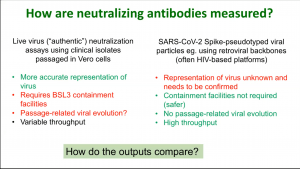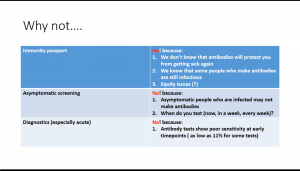The South African Immunology Society (SAIS) in collaboration with Immunopaedia hosted a webinar on “Antibody responses and serology testing” which featured talks by Professor Penny Moore & Elizabeth Mayne (Full Bio below).
Key points from Penny’s talk include:
 Description of early SARS-CoV-2 antibody (Ab) kinetics: SARS-CoV-2-IgM Abs are detected as early as 5-7 days post exposure, while IgG-specific Abs are detected with 7-14 days post exposure. Majority this Ab profiling has focused on antibodies specific to immunodominant spike glycoprotein and nucleocapsid protein, while Ab responses to M and E proteins are less studied.
Description of early SARS-CoV-2 antibody (Ab) kinetics: SARS-CoV-2-IgM Abs are detected as early as 5-7 days post exposure, while IgG-specific Abs are detected with 7-14 days post exposure. Majority this Ab profiling has focused on antibodies specific to immunodominant spike glycoprotein and nucleocapsid protein, while Ab responses to M and E proteins are less studied.- Different ways neutralising antibodies can be measured using a live virus (LAV) or pseudotyped viral particles (image below; advantages & disadvantages are colour coded). We currently do not know if nAbs are protective, however, animal models suggest that they are.
- We currently do not know how durable SARS-CoV-2 antibodies are, however, studies on other coronaviruses including SARS-Cov-1 suggest it may not be lifelong, and potentially wane >1 year post-infection.
- Data from on-going vaccine trials suggest that vaccine-induced Ab titres are in range with titres detected in convalescent individuals.
Key points from Elizabeth’s talk include:
- Serology testing is used for many infectious diseases, including for HIV infection. These tests can be manual e.g ELISA or automated (chemiluminescent assays) and can be adapted to a simple point of care test requiring very little sample and results can take < 5min.
- Summary of antibody responses and COVID-19 (see below).
- Robust detection of antibodies would mostly like occur >10 days post-infection
 Challenges associated serological testing: (1) comparison to gold standard (PCR) which could be affected by contamination and/or sensitivity issues depending on kit used, (2) timing of test, (3) do we understand the meaning of a positive Ab test, (4) could this be used for immunity passports (see image on the right), among others.
Challenges associated serological testing: (1) comparison to gold standard (PCR) which could be affected by contamination and/or sensitivity issues depending on kit used, (2) timing of test, (3) do we understand the meaning of a positive Ab test, (4) could this be used for immunity passports (see image on the right), among others.
Professor Penny Moore is the South African Research Chair of Virus-Host Dynamics and Reader / Associate Professor at the University of the Witwatersrand, South Africa, and National Institute for Communicable Diseases (NICD). She holds a joint appointment as Honorary Senior Scientist in Virus-Host Dynamics at the Centre for the AIDS Programme of Research (CAPRISA), University of Kwazulu-Natal. She works largely in the field of HIV vaccine discovery, combining Virology and Immunology, and more recently has applied many of these platforms and approaches to SARS-CoV2 research.
Associate Professor Elizabeth Mayne is and head of the academic department of Immunology at Wits. Her research interests include acute inflammation and viral infections, immunology diagnostics and tumour immunology. Elizabeth is the principal investigator of the H3A biorepository and she currently sit on the international executive of ISBER. She is passionate about immunology teaching and training.
Summary by Cheleka Mpande










